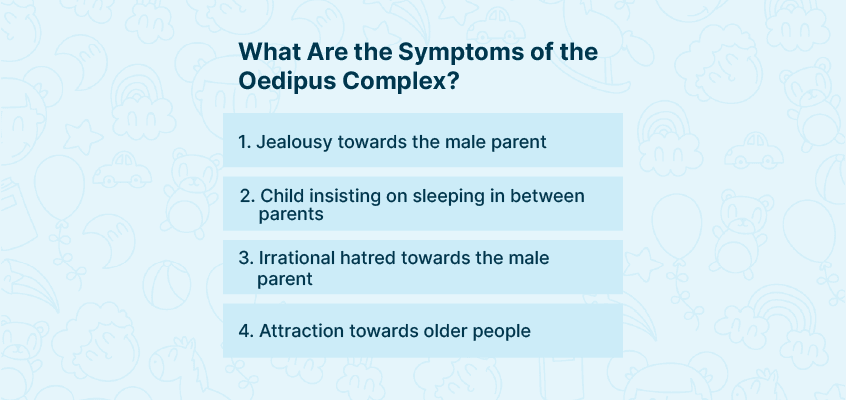Introduction
Oedipus complex is something that many children go through in their early childhood. It is a theory derived from Sigmund Freud, which discusses children’s affection toward a parent of the opposite sex. This blog covers the Oedipus complex, its stages, symptoms, and real-life examples. Keep reading ahead to learn more.
What is Oedipus Complex?
The Oedipus complex is a concept developed by Sigmund Freud. It refers to children’s emotions and feelings toward their parents, particularly the parent of the opposite sex. The term derives from the play Oedipus Rex, written by Sophocles. In this play, Oedipus unknowingly murders his father and marries his mother. According to Freud, all humans experience this at some point in childhood, but it passes before we become aware of it for most of us.
While this process in psychoanalysis is considered normal, it is usually very harmful in our society. We live in a culture that generally encourages people to be as independent as possible, posing problems for children who try to form close bonds with their parents. To prevent children from seeing their parents as competitors for their parent’s affection or attention, they are taught from an early age that these feelings are unacceptable.
What is Freud’s Theory of the Oedipus Complex?
The Oedipus complex concept in psychoanalysis describes a child’s desire for a parent of the opposite sex and simultaneous rivalry with the same-sex parent. Sigmund Freud introduced the idea in his book Interpretation of Dreams (1899). Sigmund Freud introduced the concept and coined the term Oedipus complex based on Greek mythology, killing his father and marrying his mother. The child directs these feelings toward their parents due to the unconscious perception that they are of the same sex. This psychological conflict among children settles on its own between the ages of three to six.
Freud believed that all children have sexual feelings toward their parents of the opposite sex. Thus, children often identify with one parent over another by gaining love or emulating that parent. The term is “Electra complex” for girls; for boys, the name of the complex is “Oedipus.” He also believed these feelings were repressed as a part of normal sexual development as a person grew into adulthood.
What Are the Stages of the Oedipus Complex?
According to Sigmund Freud, there are five stages of psychosexual development that lead to the Oedipus complex:
1. Oral Stage
During the oral stage (birth to 18 months), babies use their mouths to explore the world around them. They use their gums for teething and their tongues to taste and touch different objects.
2. Anal Stage
Children learn about independence during the anal stage (18 months to 3 years). They begin toilet training at this stage and learn how to control their bowels, which is also when children become interested in possessions and privacy.
3. Phallic Stage
The phallic stage is the most critical stage of psychosexual development in children. According to Freud, the Oedipal complex is a stage in psychosexual development that most males go through during the phallic stage, between ages 3 and 6.
4. Latency
This stage lasts from 5 years to around 12 years of age. During this stage, the child becomes dormant but has healthy feelings towards the opposite sex.
5. Genital Stage
The genital stage is the last stage of psychosexual development. This stage occurs during puberty and results in active sexual attraction towards the opposite sex.
Read more about: What causes Mommy Issues in men? Psychology, Meaning & Signs
What are the Symptoms of the Oedipus Complex?
There are few Oedipal complex symptoms as powerful as a child’s love for their parents. If you ask a child who their favourite parent is, they will probably say “Mommy” or “Daddy.” No matter what, children tend to favour one parent over the other.
One of the most common symptoms of the Oedipus complex is a child’s fantasy about their parents’ love life. For example, children often feel jealous because they want their parents’ attention. Thus, the child imagines how their parents would spend time with them if only the parent didn’t have to work or was home early from work.
Some other common symptoms of the Oedipus complex include:
- Jealousy towards the male parent
- Child insisting on sleeping in between parents
- The desired parent has an intense possessiveness (generally the female parent).
- Irrational hatred towards the male parent.
- Protectiveness towards the female parent.
- Attraction towards older people.
Must Read: Understanding Electra Complex and Daddy Issues
What Are the Examples of the Oedipus Complex in Literature?
The Oedipus Complex is a normal part of development. Still, it can become problematic if the child feels anger and hatred towards the parent of the opposite sex and desires to replace them in the family structure. This complex is evident in many works of great literature, and in this segment, we will look at some examples.
- In Sophocles’ Oedipus Rex, Oedipus unknowingly kills his father, Laius and marries his mother, Jocasta. He then discovers that he is their son and the King of Thebes.
- In Hamlet, he could speak to his father, who was a ghost. Due to his obsession with his mother, he was furious about his mother’s marriage to his uncle Claudius.
- In the play, O’Neill’s Long Day’s Journey Into Night, written by Eugene Edmund and Mary, both suffered from Oedipus’s complex
How to Help People with Oedipus Complex?
If someone has the Oedipus complex, they believe that love is a form of competition, and aggression and control are the basis of attraction between males and females. Many people with this condition also believe that not love but power and struggles are the basis of relationships between a mother and her child, making it difficult for people who suffer from the Oedipus complex to forge loving, lasting relationships in adulthood.
If you are experiencing feelings of inadequacy, low self-esteem, or lack of self-worth, these could be the most common symptoms of the Oedipus complex. Treatment for this condition can include Cognitive Behavioral Therapy (CBT), medication, and alternative therapies such as hypnotherapy, meditation, and cognitive restructuring.
Counselling at the United We Care allows you to explore your Oedipus complex in a safe and supportive environment. Trained Counsellors listen to you carefully, lead you through psychodynamic processes such as free association, and help you understand different aspects of your condition.
Check out Our Experts
Conclusion
The Oedipus complex is more than just a psychodynamic theory; it has also evolved into a sociological approach. The person has no control over the complex, which leads to learning about sexuality, hostility, and guilt. The key to dealing with it is channelling negative energy towards something positive.










